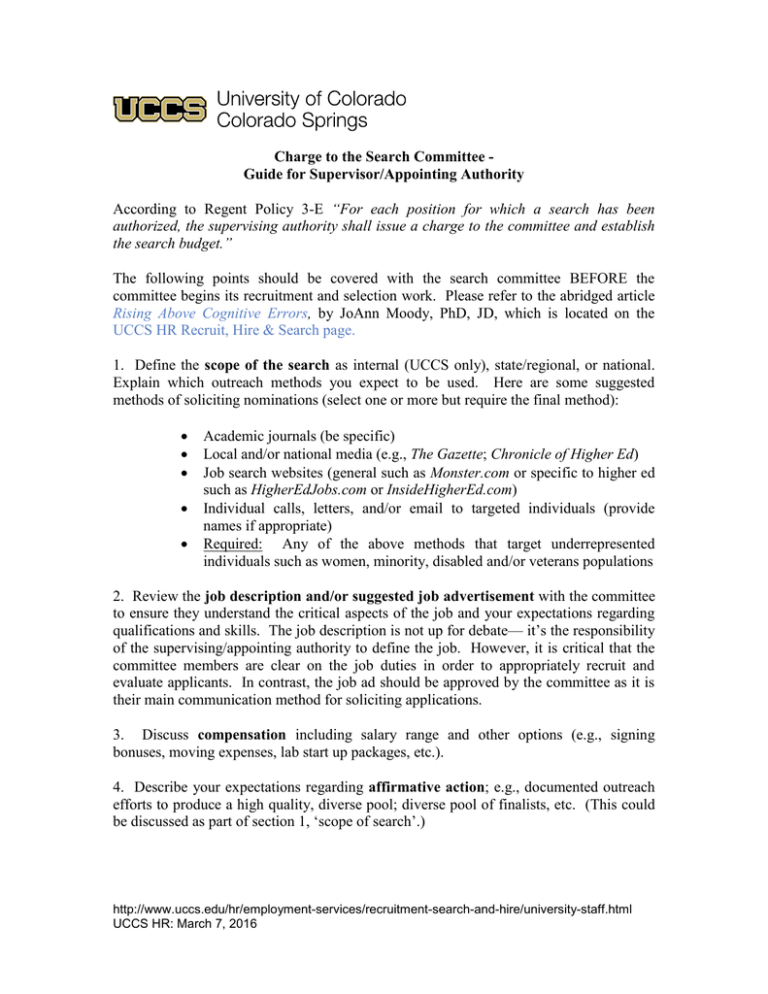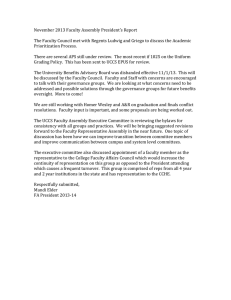“For each position for which a... Charge to the Search Committee - Guide for Supervisor/Appointing Authority
advertisement

Charge to the Search Committee Guide for Supervisor/Appointing Authority According to Regent Policy 3-E “For each position for which a search has been authorized, the supervising authority shall issue a charge to the committee and establish the search budget.” The following points should be covered with the search committee BEFORE the committee begins its recruitment and selection work. Please refer to the abridged article Rising Above Cognitive Errors, by JoAnn Moody, PhD, JD, which is located on the UCCS HR Recruit, Hire & Search page. 1. Define the scope of the search as internal (UCCS only), state/regional, or national. Explain which outreach methods you expect to be used. Here are some suggested methods of soliciting nominations (select one or more but require the final method): Academic journals (be specific) Local and/or national media (e.g., The Gazette; Chronicle of Higher Ed) Job search websites (general such as Monster.com or specific to higher ed such as HigherEdJobs.com or InsideHigherEd.com) Individual calls, letters, and/or email to targeted individuals (provide names if appropriate) Required: Any of the above methods that target underrepresented individuals such as women, minority, disabled and/or veterans populations 2. Review the job description and/or suggested job advertisement with the committee to ensure they understand the critical aspects of the job and your expectations regarding qualifications and skills. The job description is not up for debate— it’s the responsibility of the supervising/appointing authority to define the job. However, it is critical that the committee members are clear on the job duties in order to appropriately recruit and evaluate applicants. In contrast, the job ad should be approved by the committee as it is their main communication method for soliciting applications. 3. Discuss compensation including salary range and other options (e.g., signing bonuses, moving expenses, lab start up packages, etc.). 4. Describe your expectations regarding affirmative action; e.g., documented outreach efforts to produce a high quality, diverse pool; diverse pool of finalists, etc. (This could be discussed as part of section 1, ‘scope of search’.) http://www.uccs.edu/hr/employment-services/recruitment-search-and-hire/university-staff.html UCCS HR: March 7, 2016 5. Target dates for completing each stage of the search process (recruitment, selection, semifinalist interviews, on-campus interviews) and the schedule and frequency of reporting to you. Include your expected begin date for the new hire. 6. Let them know the number of finalists you expect, and whether those finalists should be ranked or unranked. Further, explain how you want to get feedback on those finalists; e.g., you would (not) like to meet with the search committee to discuss the finalist list. 7. Remind the committee that you are expecting them to maintain confidentiality during the search process, particularly in regards to internal candidates. You expect that all communications from the committee to you or others will come through the search committee chair. Encourage members with concerns or questions about the search process to contact the Human Resources Office. 8. If campus visits are conducted by the search committee (applicants are typically called ‘finalists’ at this point in the process), explain your expectations regarding campus visits, using the following: I would (not) like to be included in the interview schedule I would (not) like outside individuals to provide evaluations I am (not) willing to pay for travel, hotel and meals **All applications are confidential until the applicant is considered a finalist.** http://www.uccs.edu/hr/employment-services/recruitment-search-and-hire/university-staff.html UCCS HR: March 7, 2016

